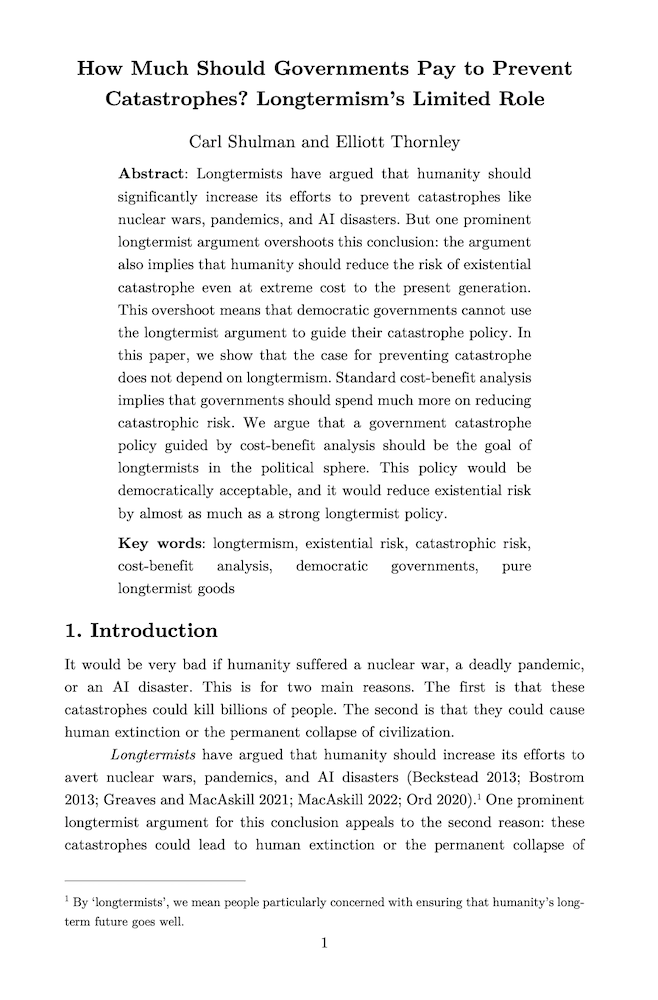How much should governments pay to prevent catastrophes? Longtermism's limited role
Carl Shulman (Advisor, Open Philanthropy) and Elliott Thornley (Global Priorities Institute, University of Oxford)
GPI Working Paper No. 8-2024, forthcoming in Essays on Longtermism
Longtermists have argued that humanity should significantly increase its efforts to prevent catastrophes like nuclear wars, pandemics, and AI disasters. But one prominent longtermist argument overshoots this conclusion: the argument also implies that humanity should reduce the risk of existential catastrophe even at extreme cost to the present generation. This overshoot means that democratic governments cannot use the longtermist argument to guide their catastrophe policy. In this paper, we show that the case for preventing catastrophe does not depend on longtermism. Standard cost-benefit analysis implies that governments should spend much more on reducing catastrophic risk. We argue that a government catastrophe policy guided by cost-benefit analysis should be the goal of longtermists in the political sphere. This policy would be democratically acceptable, and it would reduce existential risk by almost as much as a strong longtermist policy.
Other working papers
The freedom of future people – Andreas T Schmidt (University of Groningen)
What happens to liberal political philosophy, if we consider not only the freedom of present but also future people? In this article, I explore the case for long-term liberalism: freedom should be a central goal, and we should often be particularly concerned with effects on long-term future distributions of freedom. I provide three arguments. First, liberals should be long-term liberals: liberal arguments to value freedom give us reason to be (particularly) concerned with future freedom…
Imperfect Recall and AI Delegation – Eric Olav Chen (Global Priorities Institute, University of Oxford), Alexis Ghersengorin (Global Priorities Institute, University of Oxford) and Sami Petersen (Department of Economics, University of Oxford)
A principal wants to deploy an artificial intelligence (AI) system to perform some task. But the AI may be misaligned and aim to pursue a conflicting objective. The principal cannot restrict its options or deliver punishments. Instead, the principal is endowed with the ability to impose imperfect recall on the agent. The principal can then simulate the task and obscure whether it is real or part of a test. This allows the principal to screen misaligned AIs during testing and discipline their behaviour in deployment. By increasing the…
Welfare and felt duration – Andreas Mogensen (Global Priorities Institute, University of Oxford)
How should we understand the duration of a pleasant or unpleasant sensation, insofar as its duration modulates how good or bad the experience is overall? Given that we seem able to distinguish between subjective and objective duration and that how well or badly someone’s life goes is naturally thought of as something to be assessed from her own perspective, it seems intuitive that it is subjective duration that modulates how good or bad an experience is from the perspective of an individual’s welfare. …

